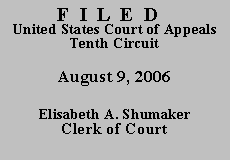

| UNITED STATES OF AMERICA,
Plaintiff-Appellee, Defendant-Appellant. |
No. 05-1517
(D.C. No. 05-CR-243-LTB) (D. Colo.) |
Mr. Casados pled guilty to one count of assault resulting in serious bodily injury in violation of 18 U.S.C. §§ 113(6) and 1152. A United States probation officer then prepared a presentence report (PSR). Among numerous other convictions, the PSR listed two Colorado convictions for third-degree assault in violation of Colo. Rev. Stat. § 18-3-204. The PSR determined Mr. Casados should be sentenced as a career offender pursuant to U.S.S.G. § 4B1.1, and recommended an offense level of 24. The PSR further recommended a three-level reduction for acceptance of responsibility. The offense level of 21, when coupled with a criminal history category of VI, resulted in a sentencing range of 77 to 96 months.
Mr. Casados objected to the PSR's career offender recommendation. The district court concluded the two Colorado convictions for third-degree assault constituted convictions for crimes of violence under this court's opinion in United States v. Paxton, 422 F.3d 1203 (10th Cir. 2005), cert. denied, 126 S. Ct. 1403 (Feb. 21, 2006). The court then sentenced Mr. Casados as a career offender to 78 months imprisonment. On appeal, Mr. Casados argues his state convictions should not be considered crimes of violence for purposes of the career offender guideline and asks us to reconsider our holding in Paxton.
Section 4B1.1(a) states that a defendant
is a career offender if (1) the defendant was at least eighteen years old at the time the defendant committed the instant offense of conviction; (2) the instant offense of conviction is a felony that is either a crime of violence or a controlled substance offense; and (3) the defendant has at least two prior felony convictions of either a crime of violence or a controlled substance offense.
U.S.S.G. § 4B1.1(a). Moreover, § 4B1.2 defines a "crime of violence" as
any offense under federal or state law, punishable by imprisonment for a term exceeding one year, that (1) has as an element the use, attempted use, or threatened use of physical force against the person or another, or (2) is burglary of a dwelling, arson, or extortion, involves use of explosives, or otherwise involves conduct that presents a serious potential risk of physical injury to another.
U.S.S.G. § 4B1.2. On appeal, Mr. Casados argues his state convictions should not be considered crimes of violence for purposes of the career offender guideline.
In Paxton, we held that "a conviction under Colo. Rev. Stat. § 18-3-204 for third-degree assault is a crime of violence under U.S.S.G. § 4B1.2(a)(2) because the conduct necessary to sustain the conviction presents a serious potential risk of physical injury to another." 422 F.3d at 1207. One panel of this court can not overrule another panel. See United States v. Brown, 400 F.3d 1242, 1256 (10th Cir. 2005). Accordingly, we conclude the district court did not err in finding Mr. Casados' prior convictions were for crimes of violence and sentencing him as a career offender.
We AFFIRM.
ENTERED FOR THE COURT
Stephanie K. Seymour
Circuit Judge
*.After examining appellant's brief and the appellate record, this panel has determined unanimously that oral argument would not materially assist the determination of this appeal. See Fed. R. App. P. 34(a)(2) and 10th Cir. R. 34.1(G). The case is therefore submitted without oral argument. This order and judgment is not binding precedent, except under the doctrines of law of the case, res judicata, or collateral estoppel. The court generally disfavors the citation of orders and judgments; nevertheless, an order and judgment may be cited under the terms and conditions of 10th Cir. R. 36.3.
1. The district court, at Mr. Casados' sentencing hearing, stated that if it were not sentencing him as a career offender and assigning him an offense level of 21, it would assign him an offense level of 19 on the ground that the tennis shoes he wore when he kicked the victim in the head constituted deadly weapons for the purposes of U.S.S.G. §§ 2A2.2 and 1B1.1. App. vol. II at 22-23. Because we conclude the court correctly assigned him the status of a career offender, we agree with Mr. Casados that we need not decide whether Mr. Casados' tennis shoes constituted deadly weapons.